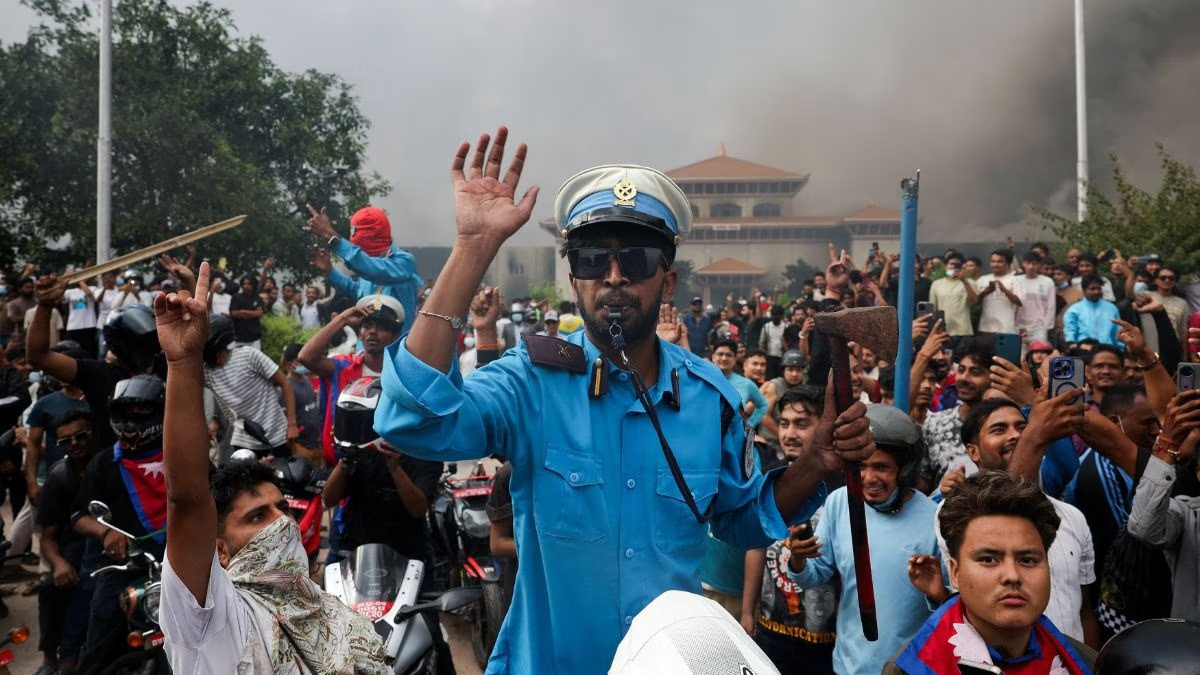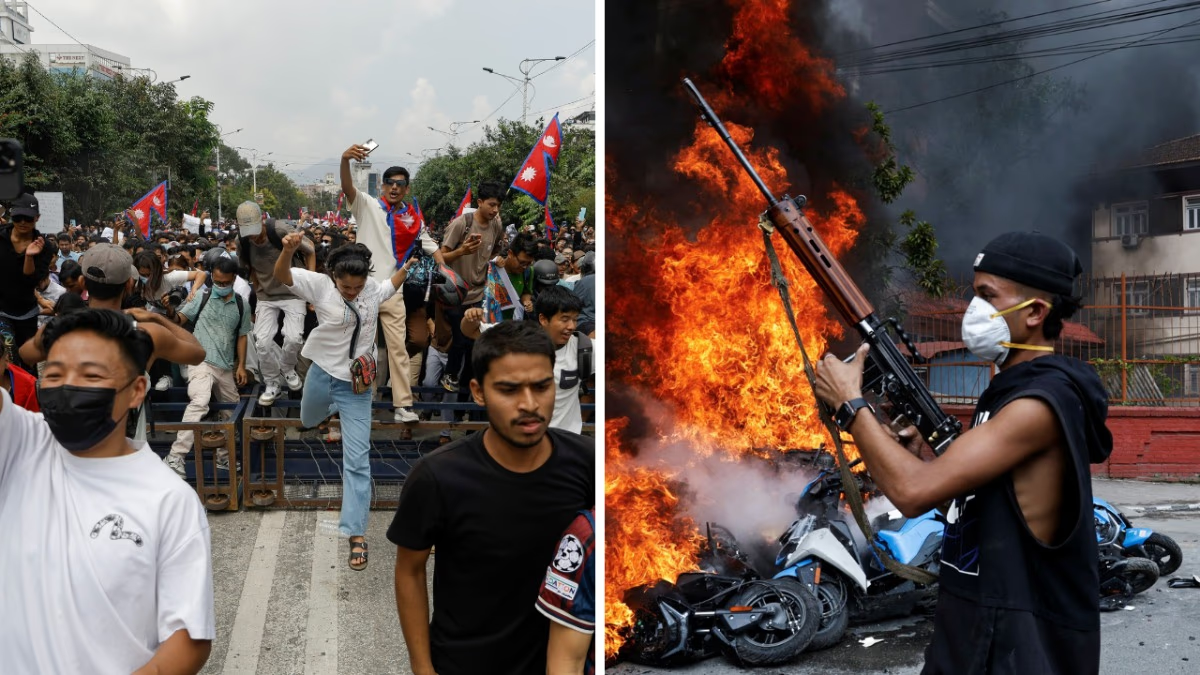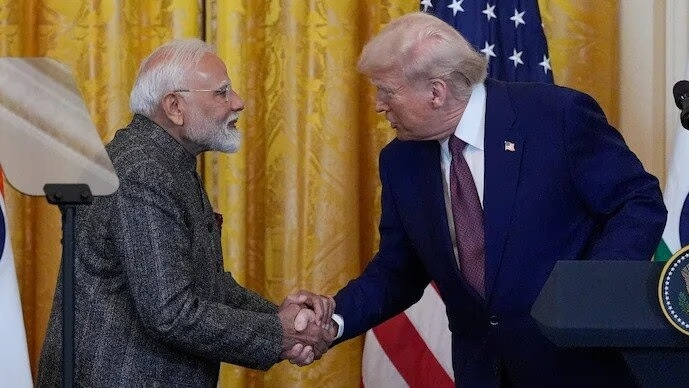Nepal is currently embroiled in an unprecedented political storm. The foundations of power have shifted, with fires igniting from the alleyways of the nation to the Parliament, Supreme Court, and the Prime Minister's residence. This is not merely a protest—it's a full-blown people-powered revolution. The pulse of this upheaval beats strongest in the young hearts of Gen Z, who have taken their fight from social media platforms to the streets.
Recently, the Nepalese government imposed bans on Facebook, Instagram, YouTube, and other social media platforms, citing the need to curb 'rumors and provocative content'. However, the younger generation viewed this as a strike against freedom of expression. Initially a digital protest, the movement soon amplified into a crescendo of public discontent over government corruption and accountability.
The same Nepal, unconquered by Mughals and unenslaved by the British, known for the valor of its Gurkha soldiers, now finds itself hollowed from within by its own leadership. Nepotism and corruption perforated the nation, leading to the people's explosion of anger. The world watches as flames of revolt sweep through the streets of Nepal.
Why is China Silent?
Amid this chaos, a significant question arises: China's silence. Nepal's critical strategic partner, China, has remained mute. Known as a steadfast ally to Oli, China broke protocol last year when Oli, newly appointed for a fourth term as Prime Minister, visited Beijing first instead of India. Yet, as Oli resigns in the wake of public uprising, China holds its silence.
The Second Day of the Movement
Protesters stormed Parliament today, setting it ablaze. The rage spared neither Prime Minister KP Sharma Oli's residence, which was ravaged by fire. In Oli's ancestral village Damak, the “Oli Tower” was set aflame. Former Prime Minister Jhalanath Khanal's residence was also targeted, where his wife sustained fatal injuries from the fire.
Even the Presidential Palace was not exempt, with President Ram Chandra Poudel's home engulfed in flames. Amidst the turmoil, several ministers, including Finance Minister Bishnu Prasad Paudel, faced the crowd's wrath, being dragged from their homes and beaten. Meanwhile, Singh Durbar in Kathmandu, the hub of Nepal's power, was overtaken by the demonstrators.
Read More: PM Modi Expresses Concern Over Nepal's Situation, Urges for Peace and Stability
The aftermath saw Prime Minister KP Sharma Oli and several ministers tender their resignations. The violence claimed the lives of two demonstrators today.
Violence and Bloodshed
On the initial day, police gunfire resulted in the deaths of 20 protesters, with hundreds more injured. The protests grew fiercer as police and military measures intensified, leading to an advisory from the army chief, urging Oli to step down, stating that the army can't fire upon the youth.
The Downfall of Oli
Prime Minister KP Sharma Oli vanished post-resignation. Sources suggest he was flown to a secure location via helicopter, possibly heading to Dubai. With his resignation, Oli's chapter in Nepalese politics draws to an imminent close.
The Movement's Demands
Gen Z has laid out five key demands. Firstly, Parliament must be dissolved immediately. Secondly, all members of Parliament should resign. Thirdly, those who ordered the gunfire should be suspended. Fourthly, an interim government should be formed under a leader recommended by Gen Z. Finally, fresh elections should be scheduled promptly.
Corruption Allegations Against Oli
Several serious allegations mar KP Sharma Oli's reputation:
Implications in a land scam.
Ignoring Supreme Court orders.
Faced contempt of court charges.
In Pursuit of New Leadership
The pursuit of new leadership has become a pivotal issue post-Oli's resignation, further adding to the political instability. At this critical juncture, Kathmandu's Mayor Balen Shah emerges as a popular figure. Once a rapper known for his anti-corruption songs, Shah's independent candidacy led him to victory in the 2022 Kathmandu mayoral election.
His zero-tolerance approach to corruption and transparency resonated with the youth. This integrity earned him a spot in Time Magazine's 2023 '100 Influencers' list. Balen Shah's leadership and vision now symbolize a beacon of hope for Nepal's future.
Following Oli's resignation, Balen urged the public, “Please stay calm. Any loss of resources is a loss for us all. Now, it’s time for your generation to lead the nation.”
Read more: Anger Against Corruption, Social Media Ban Becomes Trigger Point... The Full Story of Nepal’s 9-Month Gen-Z Movement
The Road Ahead
Nepal's political future could navigate several potential pathways. One option may see the interim government proposed by the movement take control. Alternatively, military governance could maintain order until normalcy returns. Some even speculate a revival of the monarchy abolished in 2008, while others propose a respected neutral figure, such as former judge Sushila Karki, to steer an interim government.
In these complex political times, new faces like Balen Shah inspire hope for a brighter future for Nepal. The country requires leadership grounded in transparency, integrity, and robust democratic principles.




